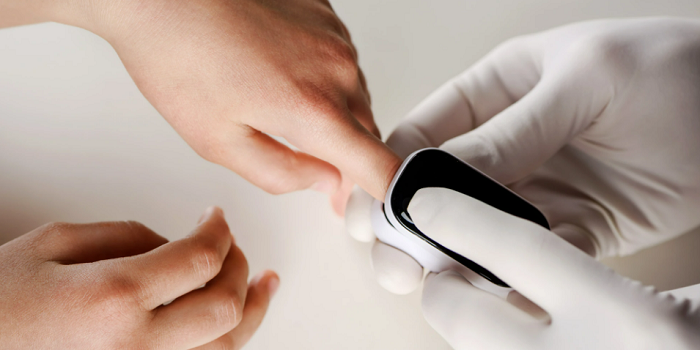All Kids should be Screened for Possibility of Sudden Cardiac Arrest, Group Says
The focus tends to be on child athletes getting a sports physical, but all kids and teens can benefit from the screening, doctors say.

Four questions asked during a routine doctor's visit could save lives, pediatricians say.NitaYuko / Getty Images stock
All children — not just those who play sports — should be screened for potential heart problems that could lead to a sudden cardiac arrest or death, the American Academy of Pediatrics said Monday.
In an updated policy statement, the organization recommended primary care physicians ask four questions during routine visits with kids “regardless of athletic status” — particularly when they start middle school and junior high school. The screening should be done at least every three years as the children continue on to high school.
Media attention to sports creates the perception that only athletes have an increased risk of sudden cardiac events, the statement noted. The recent collapse of Danish soccer player Christian Eriksen on the field during a match showed how quickly and out of the blue it can happen — with potentially deadly consequences. The 29-year-old suffered a cardiac arrest and "was gone" before he was resuscitated with a defibrillator, his team's doctor said.
But several conditions can make children prone to having their heart stop, with 2,000 people under the age of 25 suffering sudden cardiac death in the U.S. each year, the AAP statement noted. So awareness and prevention efforts should include all kids, not just those getting a preparticipation physical to see if it’s safe to play a sport, pediatric experts urged.
“It's just unimaginable to anybody in any neighborhood that the kid that you're looking at or sitting next to in class one day, the next day is not there because he had a cardiac arrest,” Dr. Christopher Erickson, lead author of the paper and a pediatric cardiologist at Children’s Hospital & Medical Center in Omaha, Nebraska, told TODAY.
He treats exactly such cases, noting they are rare but can happen in any circumstance, not just in the context of physical exertion. One condition, known as CPVT, can be triggered when a child’s adrenaline levels rise, which can happen while playing sports but also while watching a scary movie or getting very angry, Erickson said. Sudden death can come without having prior symptoms, he noted.
The updated guidance is aimed at primary care providers, including pediatricians and family practitioners, who may have “sitting right in front of them a normal child who has the potential to have a cardiac death,” Erickson said.
Doctors are advised to include the following four questions for kids and their families on their forms:
- Have you ever fainted, passed out or had an unexplained seizure suddenly and without warning, especially during exercise or in response to sudden loud noises such as doorbells, alarm clocks and ringing telephones?
- Have you ever had exercise-related chest pain or shortness of breath?
- Has anyone in your immediate family or other more distant relatives died of heart problems or had an unexpected sudden death before age 50? This would include unexpected drownings, unexplained car accidents in which the relative was driving, or sudden infant death syndrome (SIDS).
- Are you related to anyone with HCM or hypertrophic obstructive cardiomyopathy, Marfan syndrome, arrhythmogenic right ventricular cardiomyopathy, long QT syndrome, short QT syndrome, BrS, or CPVT or anyone younger than 50 years with a pacemaker or implantable defibrillator?
A “yes” to any question should lead to a cardiology evaluation, Erickson said. Lots of kids get out of breath while running around, so the second question deals more with “unexplainable shortness of breath,” he noted. Perhaps the child is unable to keep up with peers when the class is running or can’t run as much as he or she used to six months ago.
Dr. Christina Johns, a pediatrician and a pediatric emergency physician in Annapolis, Maryland, called the four questions a fairly straightforward and simple intervention that could potentially save lives.
“I welcome this this screening. I think it is important to do and could potentially catch children who may be at risk for sudden collapse,” said Johns, senior medical advisor for PM Pediatrics Urgent Care. She was not involved in writing the AAP statement.
“If we had these kinds of screening questions, sometimes we find out that these kids will have had lightheadedness or passing out during exertion — that’s always a warning sign for me that this is a child who needs to be investigated further.”
Sometimes, there’s a very simple cause: The child didn't have any breakfast, or was dehydrated or hot.
But Johns still remembers a middle-school aged girl who arrived at her emergency department in cardiac arrest and died. She was not a competitive athlete. An autopsy revealed an anomalous left coronary artery, a congenital defect where the left coronary artery, which supplies oxygen to the heart muscle, is attached incorrectly. Such conditions are rare, but the screening could prompt a primary care pediatrician to investigate a child’s cardiac anatomy, Johns said.
Kids who have otherwise normal hearts structurally, can have certain defects that can cause a sudden death, too, the AAP statement notes.
“This is focusing the attention on screening for sudden cardiac arrest, not cardiac conditions,” Erickson said.
Story Credit: https://www.today.com/health/screen-all-kids-possibility-cardiac-arrest-today-t222728


